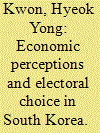| Srl | Item |
| 1 |
ID:
095558


|
|
|
|
|
| Publication |
2010.
|
| Summary/Abstract |
While the notion that subjective economic perceptions as well as objective economic conditions affect electoral outcomes has long been explored in advanced democracies and new democracies, evidence of the link between the economy and elections has been rarely found in East Asian countries. As economic issues have become salient since the 1997 financial crisis, political leaders' capacity to manage the economy has become one of the most important criteria in electoral choice in East Asia. This paper examines how economic issues influenced the results of the 2007 presidential election in South Korea. By making use of the 2007 Presidential Election Panel Study, this study examines the continuity of and changes in the Korean voters' electoral behavior. This study describes the political situation in the post-1997 financial crisis period under two liberal governments in Korea and introduces the processes and characteristics of electoral campaigns in the 2007 presidential election. This paper then explores the link between the economy and vote choice, focusing on whether economic issues were salient among the electorate, whether retrospective or prospective economic voting was prevalent among Koreans, and how the voters supported Lee Myung Bak across age groups, regions, and parties in the 2007 presidential election.
|
|
|
|
|
|
|
|
|
|
|
|
|
|
|
|
| 2 |
ID:
116632


|
|
|
|
|
| Publication |
2012.
|
| Summary/Abstract |
This paper explores the growing trend in income inequality in Korea and Taiwan. The two recent East Asian democracies have witnessed rising inequality since the 1990s but with cross-national differences. We find that market inequality is higher in Taiwan than in Korea, yet the Taiwan government's efforts to reduce this disparity are stronger than similar moves in Korea. By applying the logic of economic, social, and political effects, we find both similar trends and divergent paths in the politics of inequality in the two countries.
|
|
|
|
|
|
|
|
|
|
|
|
|
|
|
|